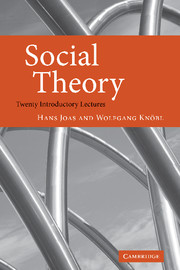Book contents
- Frontmatter
- Dedication
- Contents
- Introduction
- I What is theory?
- II The classical attempt at synthesis: Talcott Parsons
- III Parsons on the road to normativist functionalism
- IV Parsons and the elaboration of normativist functionalism
- V Neo-utilitarianism
- VI Interpretive approaches (1): symbolic interactionism
- VII Interpretive approaches (2): ethnomethodology
- VIII Conflict sociology and conflict theory
- IX Habermas and critical theory
- X Habermas' ‘theory of communicative action’
- XI Niklas Luhmann's radicalization of functionalism
- XII Anthony Giddens' theory of structuration and the new British sociology of power
- XIII The renewal of Parsonianism and modernization theory
- XIV Structuralism and poststructuralism
- XV Between structuralism and theory of practice: The cultural sociology of Pierre Bourdieu
- XVI French anti-structuralists (Cornelius Castoriadis, Alain Touraine and Paul Ricoeur)
- XVII Feminist social theories
- XVIII A crisis of modernity? New diagnoses (Ulrich Beck, Zygmunt Bauman, Robert Bellah, and the debate between liberals and communitarians)
- XIX Neo-pragmatism
- XX How things stand
- References
- Author index
- Subject index
VIII - Conflict sociology and conflict theory
Published online by Cambridge University Press: 05 June 2014
- Frontmatter
- Dedication
- Contents
- Introduction
- I What is theory?
- II The classical attempt at synthesis: Talcott Parsons
- III Parsons on the road to normativist functionalism
- IV Parsons and the elaboration of normativist functionalism
- V Neo-utilitarianism
- VI Interpretive approaches (1): symbolic interactionism
- VII Interpretive approaches (2): ethnomethodology
- VIII Conflict sociology and conflict theory
- IX Habermas and critical theory
- X Habermas' ‘theory of communicative action’
- XI Niklas Luhmann's radicalization of functionalism
- XII Anthony Giddens' theory of structuration and the new British sociology of power
- XIII The renewal of Parsonianism and modernization theory
- XIV Structuralism and poststructuralism
- XV Between structuralism and theory of practice: The cultural sociology of Pierre Bourdieu
- XVI French anti-structuralists (Cornelius Castoriadis, Alain Touraine and Paul Ricoeur)
- XVII Feminist social theories
- XVIII A crisis of modernity? New diagnoses (Ulrich Beck, Zygmunt Bauman, Robert Bellah, and the debate between liberals and communitarians)
- XIX Neo-pragmatism
- XX How things stand
- References
- Author index
- Subject index
Summary
Both neo-utilitarianism and the interpretive approaches of symbolic interactionism and ethnomethodology were reactions to the dominance of the Parsons school in the 1950s and 1960s. In both cases, the concept of action was the key subject of debate. While the neo-utilitarians found the Parsonian model of action overly normative and generally too complicated, believing that it had tended to weaken the explanatory power of sociology, the interactionists and ethnomethodologists thought Parsons' normative conception of action inadequate and insufficiently complex. The neo-utilitarians thus tried to revive the tradition of utilitarianism to which Parsons had bid farewell, while the symbolic interactionists stood in continuity with the American pragmatists whom Parsons had ignored, especially in his early work; by taking up phenomenological ideas, the ethnomethodologists set off along new, one might say dissident, paths. But all three schools wrestled primarily with the Parsonian conception of action, while the problem of social order, let alone that of social change, was paid far less attention.
The rise of so-called conflict sociology in the mid-1950s must be seen against this background; in every sense, it represents an antithesis of Parsons or of a certain understanding of Parsons. Many sociologists felt that Parsons' theoretical conception of order and change made too much of the normative elements of social reality. As a result, according to them, it merely assumed the existence of a stable social order, proceeding without reflection on the premise that societies are static and well-ordered.
- Type
- Chapter
- Information
- Social TheoryTwenty Introductory Lectures, pp. 174 - 198Publisher: Cambridge University PressPrint publication year: 2009

